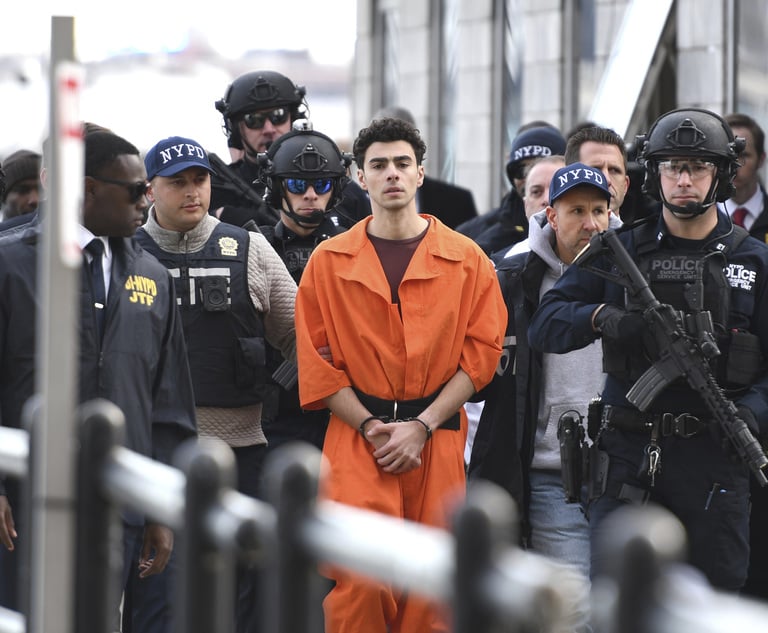Victims' Rights and White-Collar Defense
White-Collar Crime columnists Elkan Abramowitz and Jonathan Sack discuss the Crime Victim Rights Act, writing: To be sure, advocacy by putative victims can exert influence on prosecutors and courts in a manner that complicates defense of a white-collar case. At the same time, the rights of putative victims may, on occasion, give rise to disclosures that assist the defense.
July 10, 2017 at 02:03 PM
11 minute read
In recent years, policy makers have sought to give victims a greater voice in the criminal justice system. On the federal level, victims have been given the right to notice about key developments in criminal cases, consultation about a prosecutor's plea and sentencing decisions, and compensation in the case of financial injury. In 2004, Congress passed the Crime Victim Rights Act (CVRA), which specified eight rights of victims, some of which were already part of federal law. Unlike earlier legislation, the CVRA imposed on federal courts the obligation to “ensure” that victims are “afforded” these rights and established procedures for victims to assert their rights in the district court and appeal denials by petitioning for writs of mandamus.
In this article, we discuss the basic provisions of the CVRA and court decisions interpreting its reach. We then consider application of the CVRA in white-collar cases. To be sure, advocacy by putative victims can exert influence on prosecutors and courts in a manner that complicates defense of a white-collar case. At the same time, the rights of putative victims may, on occasion, give rise to disclosures that assist the defense, as we discuss further below.
The CVRA
According to its legislative history, the CVRA was intended to address a perceived imbalance in the criminal justice system between the rights of defendants and victims. 150 Cong. Rec. S4260-01, S4262 (April 22, 2004). The CVRA confers on “crime victims” the following rights: (1) to be “reasonably protected from the accused”; (2) to “reasonable, accurate, and timely notice of any public court proceeding, or any parole proceeding, involving the crime or of any release or escape of the accused”; (3) not to be excluded from any public court proceedings, unless a victim's testimony would be materially altered by hearing other testimony at the proceeding; (4) to “be reasonably heard at any public proceeding in the district court involving release, plea, sentencing, or any parole proceeding”; (5) to reasonably confer with the government's attorney; (6) to “full and timely restitution as provided in law”; (7) to “proceedings free from unreasonable delay”; and (8) to “be treated with fairness and with respect for the victim's dignity and privacy.” Codified at 18 U.S.C. §3771.
In 2015, the Justice for Victims of Trafficking Act amended the CVRA to give victims additional rights, including the right to be informed in a timely manner of a plea bargain or a deferred prosecution agreement before a formal charge was filed. Pub. L. 114-22, title I, §113(a), (c)(1), 129 Stat. 240, 241 (May 29, 2015).1 The 2015 law also resolved a circuit court split over the standard of review applicable to victims' petitions for writs of mandamus to enforce CVRA rights.
Judicial Interpretation
The CVRA defines “crime victim” as “a person directly and proximately harmed” by the “commission of a Federal offense,” but the law does not address whether courts should apply a presumption of innocence. 18 U.S.C. §3771(e); see also Attorney General Guidelines for Victim and Witness Assistance (2011 Ed. (Rev. May 2012)) (Attorney General Guidelines). In 2005, shortly after the law was enacted, Eastern District Magistrate Judge James Orenstein examined sua sponte the CVRA's notice requirements in United States v. Turner, a mail fraud case before the court for an initial appearance and bail determination based upon a criminal complaint. Judge Orenstein construed “crime victim” to mean “any person who would be considered a 'crime victim' if the government were to establish the truth of the factual allegations in its charging instrument.” 367 F. Supp. 2d 319, 326 (E.D.N.Y. 2005); accord United States v. Rubin, 558 F. Supp. 2d 411, 418-19 (E.D.N.Y. 2008) (Vitaliano, J.).
This content has been archived. It is available through our partners, LexisNexis® and Bloomberg Law.
To view this content, please continue to their sites.
Not a Lexis Subscriber?
Subscribe Now
Not a Bloomberg Law Subscriber?
Subscribe Now
NOT FOR REPRINT
© 2025 ALM Global, LLC, All Rights Reserved. Request academic re-use from www.copyright.com. All other uses, submit a request to [email protected]. For more information visit Asset & Logo Licensing.
You Might Like
View All
Luigi Mangione Defense Attorney Says NYC Mayor’s Comments on Case Raise Fair Trial Concerns
4 minute read
TikTok’s ‘Blackout Challenge’ Confronts the Limits of CDA Section 230 Immunity
6 minute read
Luigi Mangione Charged in Federal Court for Stalking, Murder and Firearms Offenses
Trending Stories
Who Got The Work
Michael G. Bongiorno, Andrew Scott Dulberg and Elizabeth E. Driscoll from Wilmer Cutler Pickering Hale and Dorr have stepped in to represent Symbotic Inc., an A.I.-enabled technology platform that focuses on increasing supply chain efficiency, and other defendants in a pending shareholder derivative lawsuit. The case, filed Oct. 2 in Massachusetts District Court by the Brown Law Firm on behalf of Stephen Austen, accuses certain officers and directors of misleading investors in regard to Symbotic's potential for margin growth by failing to disclose that the company was not equipped to timely deploy its systems or manage expenses through project delays. The case, assigned to U.S. District Judge Nathaniel M. Gorton, is 1:24-cv-12522, Austen v. Cohen et al.
Who Got The Work
Edmund Polubinski and Marie Killmond of Davis Polk & Wardwell have entered appearances for data platform software development company MongoDB and other defendants in a pending shareholder derivative lawsuit. The action, filed Oct. 7 in New York Southern District Court by the Brown Law Firm, accuses the company's directors and/or officers of falsely expressing confidence in the company’s restructuring of its sales incentive plan and downplaying the severity of decreases in its upfront commitments. The case is 1:24-cv-07594, Roy v. Ittycheria et al.
Who Got The Work
Amy O. Bruchs and Kurt F. Ellison of Michael Best & Friedrich have entered appearances for Epic Systems Corp. in a pending employment discrimination lawsuit. The suit was filed Sept. 7 in Wisconsin Western District Court by Levine Eisberner LLC and Siri & Glimstad on behalf of a project manager who claims that he was wrongfully terminated after applying for a religious exemption to the defendant's COVID-19 vaccine mandate. The case, assigned to U.S. Magistrate Judge Anita Marie Boor, is 3:24-cv-00630, Secker, Nathan v. Epic Systems Corporation.
Who Got The Work
David X. Sullivan, Thomas J. Finn and Gregory A. Hall from McCarter & English have entered appearances for Sunrun Installation Services in a pending civil rights lawsuit. The complaint was filed Sept. 4 in Connecticut District Court by attorney Robert M. Berke on behalf of former employee George Edward Steins, who was arrested and charged with employing an unregistered home improvement salesperson. The complaint alleges that had Sunrun informed the Connecticut Department of Consumer Protection that the plaintiff's employment had ended in 2017 and that he no longer held Sunrun's home improvement contractor license, he would not have been hit with charges, which were dismissed in May 2024. The case, assigned to U.S. District Judge Jeffrey A. Meyer, is 3:24-cv-01423, Steins v. Sunrun, Inc. et al.
Who Got The Work
Greenberg Traurig shareholder Joshua L. Raskin has entered an appearance for boohoo.com UK Ltd. in a pending patent infringement lawsuit. The suit, filed Sept. 3 in Texas Eastern District Court by Rozier Hardt McDonough on behalf of Alto Dynamics, asserts five patents related to an online shopping platform. The case, assigned to U.S. District Judge Rodney Gilstrap, is 2:24-cv-00719, Alto Dynamics, LLC v. boohoo.com UK Limited.
Featured Firms
Law Offices of Gary Martin Hays & Associates, P.C.
(470) 294-1674
Law Offices of Mark E. Salomone
(857) 444-6468
Smith & Hassler
(713) 739-1250







